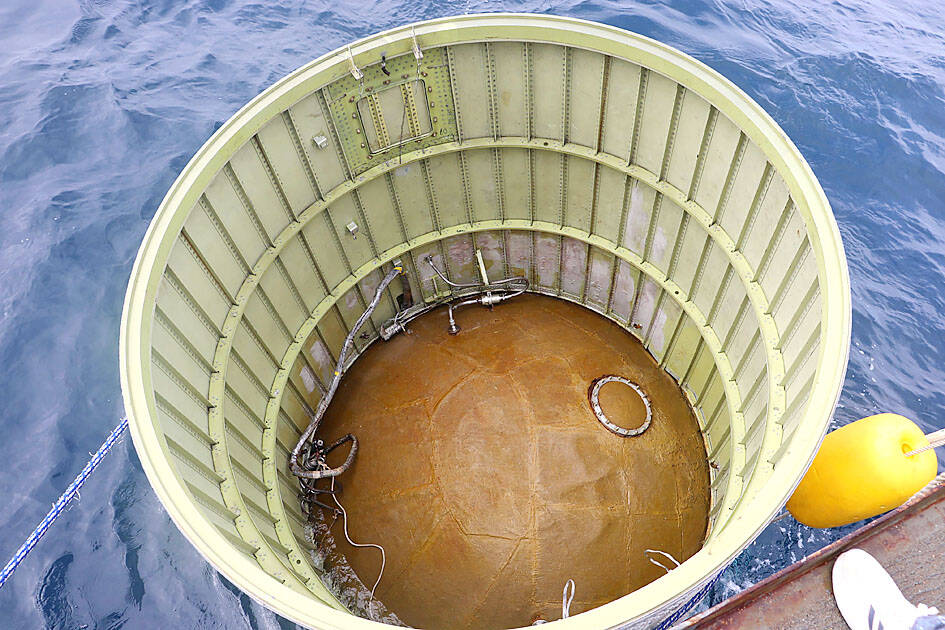North Korea attempted to launch a spy satellite yesterday, but it crashed into the sea after a rocket failure, with the South Korean military retrieving part of the likely wreckage in a potential intelligence bonanza.
North Korea does not have a functioning satellite in space and North Korean leader Kim Jong-un has made developing a military spy satellite a top priority for his regime, despite UN resolutions banning its use of such technology.
Pyongyang had said in the buildup to the launch attempt that the satellite would be vital to monitoring the military movements of the US and its allies.

Photo: AFP / South Korean Ministry of National Defense
However, the rocket lost thrust and plunged into the sea with its satellite payload, the official Korean Central News Agency reported.
It added that authorities would investigate the “serious defects” revealed by the launch and conduct another test as soon as possible.
South Korea’s military said it had managed to locate and salvage a portion of the suspected debris.
It released images showing a large barrel-like metal structure with thin pipes and wires at the bottom, which experts said might be a liquid fuel tank.
“Technical experts will be able to gain tremendous insight into North Korea’s proficiency with large, multi-stage boosters from the recovered debris,” US-based analyst Ankit Panda said.
The launch prompted confusion and panic in Seoul, as city authorities sent an early morning emergency evacuation alert to residents and blasted an air-raid siren across the downtown area.
This sparked widespread consternation online, before the South Korean Ministry of the Interior clarified minutes later the alert had been “incorrectly issued.”
“I was taking my two young children to a basement parking lot as advised, in shock,” a 37-year-old father who asked to be identified by his surname, Yoon, told reporters.
The correction left him “speechless and outraged,” he said.
Japan briefly activated its missile alert warning system for the Okinawa region early in the day, lifting it after about 30 minutes.
Seoul, Tokyo and Washington all slammed the launch, which they said contravened a raft of UN resolutions barring Pyongyang from any tests using ballistic missile technology.
UN Secretary-General Antonio Guterres called for North Korea to cease “such acts” and return to the negotiating table.
“Any launch using ballistic missile technology is contrary to the relevant Security Council resolutions,” he said in a statement.
Because long-range missiles and rockets used for space launches share the same technology, analysts say developing the ability to put a satellite in orbit would provide Pyongyang with cover for testing its banned intercontinental ballistic missiles.
In 2012 and 2016, Pyongyang tested ballistic missiles that it called satellite launches. Both flew over Japan’s southern Okinawa region.
Prior to yesterday’s launch, Pyongyang had launched five satellites since 1998, three of which failed immediately and two of which appeared to have been put into orbit. Signals from those launches have never been independently detected, indicating they might have malfunctioned.

The CIA has a message for Chinese government officials worried about their place in Chinese President Xi Jinping’s (習近平) government: Come work with us. The agency released two Mandarin-language videos on social media on Thursday inviting disgruntled officials to contact the CIA. The recruitment videos posted on YouTube and X racked up more than 5 million views combined in their first day. The outreach comes as CIA Director John Ratcliffe has vowed to boost the agency’s use of intelligence from human sources and its focus on China, which has recently targeted US officials with its own espionage operations. The videos are “aimed at

STEADFAST FRIEND: The bills encourage increased Taiwan-US engagement and address China’s distortion of UN Resolution 2758 to isolate Taiwan internationally The Presidential Office yesterday thanked the US House of Representatives for unanimously passing two Taiwan-related bills highlighting its solid support for Taiwan’s democracy and global participation, and for deepening bilateral relations. One of the bills, the Taiwan Assurance Implementation Act, requires the US Department of State to periodically review its guidelines for engagement with Taiwan, and report to the US Congress on the guidelines and plans to lift self-imposed limitations on US-Taiwan engagement. The other bill is the Taiwan International Solidarity Act, which clarifies that UN Resolution 2758 does not address the issue of the representation of Taiwan or its people in

US Indo-Pacific Commander Admiral Samuel Paparo on Friday expressed concern over the rate at which China is diversifying its military exercises, the Financial Times (FT) reported on Saturday. “The rates of change on the depth and breadth of their exercises is the one non-linear effect that I’ve seen in the last year that wakes me up at night or keeps me up at night,” Paparo was quoted by FT as saying while attending the annual Sedona Forum at the McCain Institute in Arizona. Paparo also expressed concern over the speed with which China was expanding its military. While the US

SHIFT: Taiwan’s better-than-expected first-quarter GDP and signs of weakness in the US have driven global capital back to emerging markets, the central bank head said The central bank yesterday blamed market speculation for the steep rise in the local currency, and urged exporters and financial institutions to stay calm and stop panic sell-offs to avoid hurting their own profitability. The nation’s top monetary policymaker said that it would step in, if necessary, to maintain order and stability in the foreign exchange market. The remarks came as the NT dollar yesterday closed up NT$0.919 to NT$30.145 against the US dollar in Taipei trading, after rising as high as NT$29.59 in intraday trading. The local currency has surged 5.85 percent against the greenback over the past two sessions, central